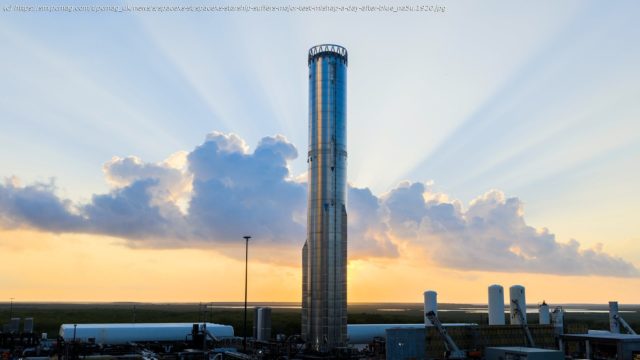SpaceX’s lunar-landing ambitions now look a bit harder than they did a week ago, as rival Blue Origin moves ahead with New Glenn upgrades that will send its Blue Moon landers to the Moon.
A test mishap on Friday morning with the first stage of the new version of SpaceX’s Starship rocket left part of the booster blown open and peeled apart, a new setback to a giant launch vehicle that has already seen its star-crossed moments.
Video of tests for the Super Heavy stage of Starship’s Block 3 design showed gases suddenly whooshing out of the lower third of the booster, after which pictures in daylight revealed a level of severe structural damage that no rocket in flight could survive.
SpaceX posted on X Friday morning that this booster “suffered an anomaly during gas system pressure testing that we were conducting in advance of structural proof testing,” adding that the test involved neither Starship’s methane propellant nor its 33 Raptor engines.
« The teams need time to investigate before we are confident of the cause », the post advised.
SpaceX CEO Elon Musk had not commented on this as of 2:45 p.m. Eastern, instead busying himself online by hyping X’s Grok AI chatbot and Tesla’s “Full Self-Driving” system.
SpaceX has historically excelled by being willing to risk things blowing up. It had two Falcon 9 boosters in a row explode in landing attempts before succeeding in 2015, and has since nailed more than 500 landings. Last week, it notched its 500th launch with a reflown booster.
However, Starship has not yet achieved anything close to Falcon’s reliability. Among 11 test flights to date, five ended with Starship’s upper stage failing to fly a planned suborbital trajectory. Starship’s booster had been the most reliable part of the vehicle, but Friday’s test featured the new, more powerful Block 3 variant, which has not yet flown.
“It’s hard to speculate right now, but this is definitely a setback,” Chris Combs, an aerospace professor and associate dean at the University of Texas at San Antonio, said in an email Friday morning.
Home
United States
USA — software SpaceX's Starship Suffers Major Test Mishap a Day After Blue Origin Unveils...






